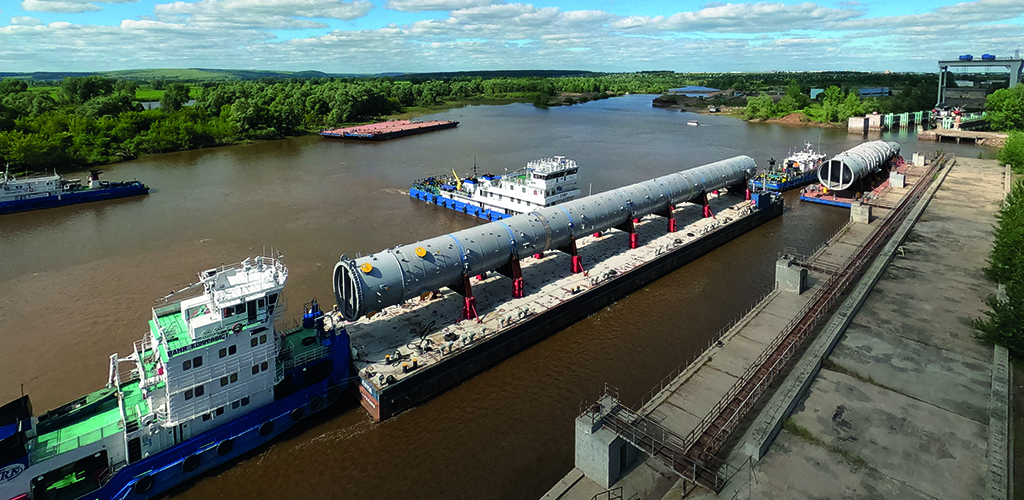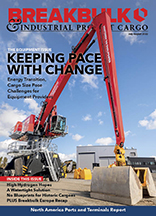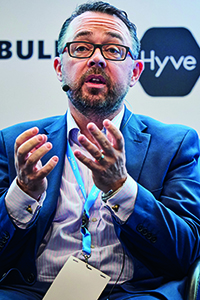Jul 06 | 2022
deugro’s Tim Killen Extols the Power of Relationships

By Carly Fields
 “Moving cargo has never been more complicated or more time consuming.” Tim Killen, chief sales officer of freight forwarder deugro, gets right to the nub of the challenges unsettling the breakbulk and project cargo industry today in conversation with Breakbulk.
“Moving cargo has never been more complicated or more time consuming.” Tim Killen, chief sales officer of freight forwarder deugro, gets right to the nub of the challenges unsettling the breakbulk and project cargo industry today in conversation with Breakbulk.The obstacles are mounting up and top of the pile is costs, schedule, and availability of space. Tendering, pricing, contracting; with the current supply chain issues, these ‘standard’ practices now monopolize the time of forwarders. “Shipments that we used to do previously in a matter of hours or days now can take up to five times longer than they did before,” Killen said.
 Then there is the human factor to consider. “We are a people business, we are a skills business,” he said, and there isn’t a ready pool of qualified people to step into this highly technical business to take the pressure off. deugro has invested heavily in additional resources within its organization over the last 18 months to support these critical aspects of the business.
Then there is the human factor to consider. “We are a people business, we are a skills business,” he said, and there isn’t a ready pool of qualified people to step into this highly technical business to take the pressure off. deugro has invested heavily in additional resources within its organization over the last 18 months to support these critical aspects of the business.Projects that were awarded just before Covid hit in March 2020 and then continued to be delivered through 2020 brought sleepless nights. They called for fast thinking to solve the problem of equipment that couldn’t be moved from vendors because of the domino of lockdowns. When suspended or paused projects then started to move again, the crunch was amplified.
“It was really at that point that the supply chain, the logistics costs, availability, and ability to deliver really became apparent. The biggest risk we faced during the pandemic was trying to continue to deliver projects contracted in pre-pandemic times – which were contracted on fixed prices and/or strict contracts.”
Killen said that many projects now coming back on stream need to be repriced, not just by forwarders but also by customers, because the landscape has completely changed. “There is a lot of work now being completed to revalidate or even completely refresh tenders and projects that we had looked at pre-pandemic.” Positively, deugro reports a strong pipeline with projects becoming more viable and approaching final investment decision.
Call for Collaboration
This transformation of the business prompts Killen to recognize the importance of greater collaboration to better prepare the industry for what the future may bring. He urged project cargo logistics stakeholders to recognize, benchmark and get some commonality on the challenges that the industry faces in the supply chain, shipping, transport and logistics. “We need to reconnect, review and refocus for the future and get a robust and sustainable plan of action together,” he said.
The upset of Covid inadvertently prompted industries to recognize the importance and need for better preparation for the unexpected and risk management contingency, which was a blessing when it came to dealing with the repercussions of Russia’s invasion of Ukraine and the resurgence of Covid, he said. Most importantly, there has been a shift in terms of the relationships between forwarders up the chain to customers and down the chain to partners. “Relationships have evolved and grown over the past two years. Before it could be very contract-led, but the changing landscape has allowed us a seat at the table to engage with customers and really discuss and highlight the challenges we are facing in terms of lockdowns, availability, supply chain security and cost.”
This engagement was a “big challenge” in the beginning of Covid-19 because customers across the global supply chain were facing their own issues of business continuity and delivery. But today there is a greater interest to work collaboratively, an openness and a willingness to discuss potential challenges and design solutions more closely. “That’s supported the entire industry to be more aligned, have an improved understanding of the challenges each other faces and then to be able to look into the best solutions – rather than an autocratic client-to-vendor, vendor-to-shipper situation. It’s really about that collaboration to support supply chain transformation and resilience – that has been a positive outcome.”
An upshot of closer working relationships is that deugro and the topic of logistics is now a central part of discussions on decentralized supply chains and decentralized energy demand. “We’re part of that conversation with our customers in order to design new supply chains and de-risk future project cargo deliveries,” Killen said. “These were conversations which we didn’t have as often before.”
Logistics as an Enabler
This new openness is helping to balance risk and helping suppliers to make more educated decisions on how projects can be delivered. “Clients understand the value of interaction not just with ourselves, but with their vendors and also with their customers as well. Senior procurement stakeholders in some of the global organizations that we work with have a greater understanding of the importance and the value of logistics in the supply chain, and see it as a proactive enabler rather than it being a reactive service that happens in the background during project execution.” Consequently, today there is a lot more interest in solutions, designs, de-risking and making sure project and critical equipment can be delivered on time, on budget and on schedule. Some discussions were invariably easier than others, but Killen said that overall, through engagement and collaboration as an industry, we are heading in the right direction.
Leveraging these enriched relations, Killen is excited by the energy transition and global sustainability goals, and how both are already shaping project cargo demand. “There’s a huge amount of weight behind both at a global level. And there is a fantastic amount of opportunity for us to get involved in.” Earlier this year, deugro launched a new sustainable energy division, providing a dedicated global team to lead deugro’s investment and commitment in delivering innovative logistics solutions to support the global energy transition.
But they won’t be travelling on this road alone: “We need the commitment and engagement with our customers to deliver a sustainable and low carbon future, and so far we are seeing success.” Here, Killen highlights success in the offshore renewable field in partnership with Siemens Gamesa. “The scope and scale of how quickly this is going to grow in the next 5-10 years is exponential and we’re here to support that.”
However, Killen acknowledges that while the potential is great, there are still concerns. “In terms of the potential growth, this industry needs to be supported, whether that’s through capacity and competence of people, technology investments and developments, as well as governmental support in legislation and common goals. The energy transition is a major global challenge in a world which, at the moment, is facing severe supply chain disruption and unpredictability.”
Carly Fields has reported on the shipping industry for the past 22 years, covering bunkers and broking and much in between.
